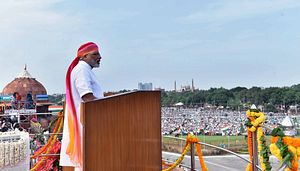Bold words marked the 70th anniversaries of independence for both India and Pakistan. Nawaz Sharif, prime minister of Pakistan, dedicated the day to the freedom of Indian-occupied-Kashmir, which is currently undergoing significant civilian unrest following the killing of separatist military commander Burhan Wani. “I dedicate this year’s 14 August to the freedom of Kashmir. I dedicate it to those people of Kashmir, who bravely faced the state oppression but kept the spirit of freedom alive,” Sharif was quoted as saying.
Indian Prime Minister Narendra Modi fired back at Pakistan in his annual Independence Day address, accusing Pakistan of fanning unrest and glorifying terrorism. “They glorify terrorists who attack us,” he said, reminding the world that India “cried with sorrow” over the death of 130 children who were killed two years ago during the Peshawar massacre.
However, what appeared to be a typical occurrence — a exchange of barbed words between the two countries — quickly revealed a shift in normalcy in the relations between the two neighboring countries. Modi’s once friendly and reconciliatory policy with Pakistan has been dropped completely; there will be no more surprise visits from Modi to Pakistan any time soon, nor will there be any more calls between the premiers to celebrate Eid or other religious holidays.
What’s more, it seems India has a new strategy altogether. In his speech, Modi acknowledged the thanks of the people of Pakistan-occupied Kashmir, Gilgit, and Balochistan, explicitly drawing attention to their troubles within Pakistan. By choosing to highlight human rights abuses and the independence movement, particularly in Balochistan, Modi is signaling a new, more aggressive Indian foreign policy toward Pakistan. If Pakistan continues to raise the issue of human rights violations in India-occupied Kashmir then India will do just the same in Pakistan’s most sensitive province.
Pakistan has long accused India of fueling terrorism in Balochistan, its largest province, and of supporting its independence movement. Islamabad painted India as the aggressor in 2009, when the Sharm el-Sheikh joint statement by the two countries referred to state-sponsored terrorism in Balochistan, effectively causing India to admit to such. L.K. Advani, senior leader of India’s ruling BJP party, mentioned as much in 2009, saying the statement “will haunt the country for a long time to come.”
Modi’s current statements reverse Islamabad’s narrative of India as an occupying force, putting the emphasis equally on Pakistan’s own atrocities. Modi wins India a bargaining chip in all future discussions on Kashmir by giving India a role in Balochistan. As India views Kashmir as a domestic issue, just as Pakistan views Balochistan, Modi has just signaled that any move to internationalize Kashmir’s issues would be accompanied by a move to internationalize Balochistan’s issues.
Pakistan reacted forcefully, viewing this as blatant admission to India’s hand in the separatist movement. “The Indian premier’s speech is proof that his country is meddling in Balochistan. Indian and Afghan spy agencies are backing Baloch insurgents and working to destabilize Pakistan,” Anwar-ul-Haq Kakar, a spokesman for the Balochistan’s provincial government, said.
But with India now being able to provide moral support to the Baloch separatist movement, it looks like the damage has been done to Pakistan. Balochistan holds vast quantities of Pakistan’s natural resources and provides access to the Arabian Sea through Gwadar Port. Any further unrest in the area could completely destabilize Pakistan and its geopolitical position.
On top of all of this, there is an additional context: China. The China-Pakistan Economic Corridor (CPEC) that links China’s Xinjiang Uyghur Autonomous Region to Gwadar Port in southwestern Pakistan runs through both Pakistan-occupied Kashmir and Balochistan. Any attempt to destabilize either region would be a major threat to the $46 billion dollar project.
Though Chinese state media has signaled that India should “remain open” and not jeopardize the CPEC, not wanting to damage the project, China has distanced itself from the Kashmir situation and from Pakistan’s side on the dispute, weakening Pakistan’s hand. Its state media has gone as far as to begin referring to “Pakistan-occupied Kashmir” rather than the original term, “Pakistan-administered Kashmir.”
All in all, it looks like the rules of the game have just changed for India and Pakistan, with Pakistan’s hand being massively weakened in lieu of a much more aggressive Indian neighbor that can match Pakistan’s call for Kashmir’s freedom with an Indian call for Baloch freedom.
Saad Khan is a Pakistani writer currently living in Bahrain. He has written previously for Cultnoise Online, Gulf Daily News, and The International Policy Digest.

































